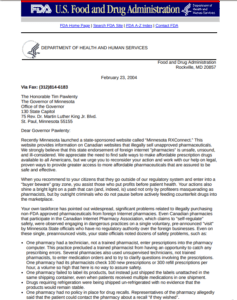Minnesota’s Experiment With Drug Importation: RxConnect 2003-2010
Minnesota was one of the first states to experiment with drug importation as a way to manage rising prescription prices. In 2003, Governor Tim Pawlenty launched Minnesota RxConnect, a program to import cheaper, non-FDA-approved medicine for Minnesota residents and state employees so that low income and elderly residents could afford the medications they needed. Initially, estimates projected that as many as 700,00 people would be using the program each and every month, but according to research by the Pew Charitable Trust, enrollment numbers never came anywhere close to that.

Letter from the FDA to Minnesota Gov. Tim Pawlenty, February 2004. Read the entire letter.
A report by Minnesota's Department of Human Services (DHS) states that Pawlenty ordered DHS to examine the feasibility of importing drugs from approved Canadian online pharmacies in September of 2003. In December of that year, they sent out letters to several dozen pharmacies, heard back from about 25 of them, and sent state representatives to visit nine. Minnesota RxConnect launched at the end of January 2004, eventually offering Minnesota residents four pharmacies from which to order: Canada U.S. Pharmacy, Granville Pharmacy, Total Care Pharmacy, and CanadaDrugs.com, a company that shut down in July 2018 after shipping counterfeit cancer medications to U.S. physicians and medical clinics.
Within a month of the program's launch the FDA warned Pawlenty that RxConnect was not operating safely. FDA safety officials noted that even in pre-announced visits, Minnesota state officials had found and reported violations that would have shut down any pharmacy operating in Minnesota:
- One pharmacy asked pharmacists to review 100 new prescriptions or 300 refill prescriptions per hour, a volume so high that there was no way to assure safety.
- Another pharmacy failed to label its products, shipping labels unattached in the same shipping container, even when patients received multiple medications in one shipment.
- Drugs requiring refrigeration were being shipped unrefrigerated, with no evidence that the products would remain stable.
- One pharmacy had no policy in place for drug recalls.
- Several pharmacies violated good prescribing practices by dispensing grossly improper amounts of medications.
- One pharmacy re-dispensed medicines that were not labeled and apparently had been previously returned by U.S. Customs and Border Protection.
The Minnesota program was shutdown in March 2010 because of a lack of realized savings and changing market conditions. In January 2005, over 1,100 prescriptions were being filled every month. By January 2006, when Medicare Part D went into effect, that figure was below 600. By December 2009, the month before Minnesota announced that the program would be phased out, Minnesota residents only ordered 57 prescriptions.
In the end, Minnesota RxConnect didn't save substantial money, and it may have dispensed substandard or placebo medications. Since the state never implemented a laboratory testing program for these non-FDA-approved medications, the total scope of patient harm can never be known.

